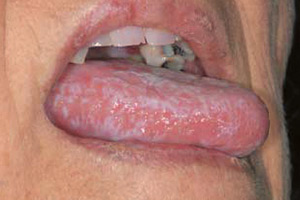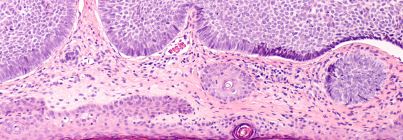Oral Mucosal Diseases
Care for Painful Mouth Problems

What is Oral Mucosal Disease?
The oral mucosa is the mucous membrane lining or “skin” inside of the mouth, including cheeks and lips. People with oral mucosal diseases may develop painful mouth sores or ulcers on this lining.
Mucosal diseases can affect any mucous membrane. These membranes are also found inside the nasal passages, eyes, genitals and digestive tract.
Oral mucosal diseases can cause painful mouth problems.
What Causes Oral Mucosal Disease?
Oral mucosal diseases may have an autoimmune link, meaning the body’s immune system attacks healthy cells. Some mucosal diseases are inherited.
Our Mucosal Disease Partners
Mucosal diseases can affect different parts of the body. We partner with other UC Davis Health specialists to provide comprehensive care. Depending on your unique situation, you may also see specialists in:
- Gastroenterology (digestive problems)
- Gynecology (women’s health)
- Ophthalmology (vision)
- Otolaryngology (ear, nose and throat disorders)
- Rheumatology (arthritis)
Oral Mucosal Diseases We Treat
Your physician creates a personalized treatment plan based on your specific condition and symptoms. We treat all types of oral mucosal diseases, including:
- Behcet disease
- Burning mouth syndrome
- Oral lichen planus
- Pemphigus and pemphigoid
- Recurrent aphthous stomatitis
- Sjögren’s syndrome
Behcet disease
This rare condition inflames blood vessels throughout the body and can cause joint pain.
People living with Behcet disease develop painful sores on the lips, tongue, cheeks, roof of the mouth, throat and tonsils. Sores also commonly occur on the genitals, eyes and skin. While the cause is unknown, the condition may be inherited or triggered by an autoimmune disease.
In addition to clinical trial therapies, treatments include:
- Prescription mouthwash to relieve pain and discomfort
- Topical or oral corticosteroids to ease inflammation
- Immunosuppressants to help control the immune system and alleviate inflammation
- Selective phosphodiesterase 4 (PDE4) inhibitors (Otezla®) to treat oral ulcers
Burning mouth syndrome
This condition causes a painful burning, scalding or tingling sensation in the mouth. Symptoms most often affect the tongue and lips. The problem does not cause blisters, but it can affect taste.
Burning mouth syndrome is more common in older women. Possible causes include:
- Anemia
- Chronic dry mouth
- Diabetes
- Medications
- Vitamin and other nutritional deficiencies
Treatments may include:
- Lifestyle modifications (dietary or medication changes)
- Oral and topical pain relievers
- Vitamin supplements
- Saliva substitutes and stimulants
- Medications such as benzodiazepines, tricyclic antidepressants and gabapentin
Oral lichen planus
This chronic condition inflames the mucous membranes of the cheeks, tongue, gums and esophagus. It can also affect the genitals and skin. People living with this disorder develop red, swollen tissues and white, lacy patches on mucous membranes. Painful, burning sores may also develop.
The disease may be an autoimmune disorder and is most common in women over the age of 50. People living with oral lichen planus have a higher risk of developing oral cancer, a type of head and neck cancer. For this reason, it is important to receive regular care from an oral lichen planus specialist. While there is no cure for oral lichen planus, the right treatments can ease symptoms and control the disease.
Treatments include:
- Topical or oral corticosteroids to reduce swelling
- Immunosuppressants to control an overactive immune system response
- Intravenous immunoglobulin (IVIG) antibodies therapy to fight infections
Pemphigus and pemphigoid
Pemphigus and pemphigoid are rare autoimmune diseases that cause fluid-filled blisters to form on the skin and in mucous membranes throughout the body. The blisters may cause painful itching or burning sensations. Extensive blistering can lead to fluid loss and infections.
We focus on treating your symptoms and putting the disease into remission.
Treatments include:
- Antibiotics to treat infections
- Anti-inflammatory drugs to minimize swelling and inflammation
- B-cell therapy (Rituxan®) to destroy abnormal B cells
- Topical, injectable or oral corticosteroids to decrease inflammation and swelling
- Immunosuppressants to manage an overactive immune system
- Intravenous immunoglobulin (IVIG) therapy to generate antibodies that fight infection
Recurrent aphthous stomatitis
This condition causes painful, sometimes burning, blisters to form on the inside lining of the lips or mouth. It often develops during childhood.
People living with aphthous stomatitis may have other conditions, such as:
- Behcet disease
- Celiac disease
- Human immunodeficiency virus (HIV)
- Inflammatory bowel disease
Treatments include:
- Prescription mouthwash to kill mouth bacteria and ease ulcer pain
- Topical, oral or injectable corticosteroid to decrease inflammation
- Immunosuppressants to slow the immune system’s response and reduce inflammation
Sjögren’s syndrome
Sjögren’s syndrome is an autoimmune condition that reduces saliva and tear production, causing dry mouth and dry eyes. It most often affects women over the age of 40 and may also lead to:
- Digestive problems
- Dry skin
- Fatigue
- Joint pain
People with Sjögren’s syndrome often have other autoimmune diseases, such as rheumatoid arthritis or lupus. That’s why we partner with experts in our Rheumatology-Dermatology Clinic to manage all of your symptoms.
Treatments may include:
- Artificial tear solutions to moisturize and soothe irritated dry eyes
- Saliva substitutes or stimulants to increase saliva production
- Over-the-counter pain relievers, such as ibuprofen and acetaminophen, to alleviate pain
- Anti-inflammatory drugs, including corticosteroids, to reduce swelling and inflammation
- Immunosuppressants to slow the immune system’s response and reduce inflammation
- Anti-rheumatics to treat rheumatoid arthritis pain and swelling
Contact Us
For more information or to schedule an appointment, please call 916-734-6111 or 800-770-9282.


